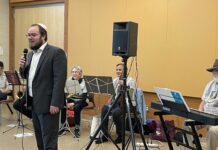Hillels of Baltimore, a group of five Hillel chapters located on Baltimore-area campuses that are supported by The Associated: Jewish Federation of Baltimore, is celebrating its 25th year of operation.

Originally known as Hillel of Greater Baltimore, the collective first began operating in 1998. It provides support for the Hillels under its umbrella and fosters collaboration.
Goucher College Hillel, Johns Hopkins University Hillel, Towson University Hillel and University of Maryland, Baltimore County Hillel have always been included under this banner. In recent years, the group has grown to include University of Maryland, College Park Hillel, which is what led to the name change.
For the first decade of Hillels of Baltimore, the group was more centralized. It had one regional director with staff that would go to each campus as needed.
Nowadays, each campus has its own dedicated staff. This allows for the lay leadership and staff to dedicate more resources to each campus and meet the specific needs of each campus, said Rabbi Josh Snyder, who has served as Goucher Hillel’s executive director since 2008.
“Obviously, each campus has different needs,” Snyder noted.
Snyder said that while not every Baltimore Hillel chapter started in 1998, as some opened beforehand, the year marks the first time that the original four chapters all had professional coordinators on campus.
The Associated provides funding and resources for program coordinators on each campus, including training for mental health support and suicide prevention. The organization supports these five Hillel chapters financially and promotes them like it does its other agencies.
“Being a part of that network is a huge benefit and lets us really focus our attention on the students, as opposed to a lot of the things that would otherwise be necessary to make the organization function at all,” explained Rabbi Alex Salzberg of Towson Hillel.
One significant benefit of Hillel of Baltimore is that it fosters cooperation and collaboration between the different campuses. Representatives from each campus meet once a month to discuss ideas they have for programming and to plan programs that bring all of the Hillels together. They hold a collaborative Shabbaton retreat every year and cooperate on Birthright programs and special events.
Hillels of Baltimore brings together several diverse schools with very different demographics under a united banner of Judaism.
“Towson and UMBC are large state schools and have significant commuter populations, Goucher is a small liberal arts college, and Johns Hopkins is an elite private university,” Snyder said. “They all have very different campus cultures with different student needs. It’s important that each of the Hillels are able to work closely with the administration on campus to be as much a part of campus life as possible, while still offering an opportunity for Jewish students to connect with other students in the region.”
Hillel communities are tight-knit and often see alumni returning to take on leadership positions, something that Salzberg says is a common occurrence at Towson Hillel. He noted that while much of their success is due to The Associated’s generous support, Hillels are still largely student-run and depend on the hard work of their members.
“Any time I walk outside my office, there’s a minimum of five students sitting there, excited to talk about Jewish life, family and Israel,” he said. “It’s a constant reminder of why I do this and how lucky I am to be able to engage with such thoughtful, committed and brilliant students on campus.”
Currently, Hillels of Baltimore is planning for how to celebrate the 25th anniversary, as well as future programs. In addition to an upcoming program about combating antisemitism, it is also working on forming a partnership between Jewish students and Black students from historically Black colleges and universities, which is modeled off a similar program that was put into place in Atlanta.
“People often talk about the different challenges there may be in terms of being Jewish on a college campus,” Snyder said. “We look at those as opportunities to connect and to create community. That’s what I love about this work, and why we’ve been doing it for 25 years. I hope to be doing it for many, many more.”







